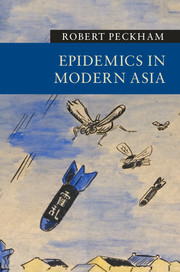‘Richly researched and keenly argued, Robert Peckham puts epidemic disease at the centre of a modern history of Asia. From China to India, this book unravels a history in which biology and Asian modernities have shaped one another. In so doing, he freshly recasts our understanding of how disease and social worlds are linked in complex political ecologies with unexpected pasts.'
Alison Bashford - University of Cambridge
‘Accessible and engaging, yet subtly nuanced and perceptive, Epidemics in Modern Asia offers a masterful synoptic overview. It should find a place in many university syllabi, and will enhance courses on globalization and Asian societies, as well as histories of medicine, public health, and the environment.'
Shigehisa Kuriyama - Harvard University, Massachusetts
‘Epidemic disease presents a critical challenge for human societies, none more so than those in Southeast Asia. Faced with imminent outbreaks and the prospect of future pandemics, the past is too often forgotten. In Epidemics in Modern Asia, Robert Peckham provides a salutary and timely reminder of why the past matters. He shows how history can help us to think in new ways about the cultural, social, and political dimensions of epidemics. Peckham not only writes disease back into history, but brings that history alive and demonstrates that the past is never in fact past. This highly original and important book should be required reading, not only for historians of modern Asia, but for those working on the frontline of public health.'
Peter Piot - London School of Hygiene and Tropical Medicine
‘This excellent book provides an insightful and wide-ranging perspective on the role of epidemics in the making of modern Asian history. Robert Peckham's narrative moves deftly from the level of the individual neighbourhood to the regional scale of inter-Asian connections. Epidemics in Modern Asia demonstrates that epidemics have provoked political, social, and cultural responses that have transformed modern Asian states and societies. Peckham shows both the imperial continuities and the postcolonial ruptures in the health policies pursued by Asian nations. He deploys astute historical analysis to illuminate contemporary globalization in Asia, with its attendant and recurrent epidemic panics. Students will appreciate the book's lucidity and concision; specialists in the field will learn a lot from the sophisticated connections Peckham makes between medical, social, and political history.'
Sunil Amrith - Harvard University, Massachusetts
'This work provides a new model for historians who have an interest in disease epidemics and gives the epidemiologists, who are currently highly medicalised, the opportunity to appreciate the foresight of Rudolf Virchow, a giant in the field of bioscience in Germany in the 19th century and the father of modern pathology, as well as one of the founders of modern public health, who stressed the importance of understanding social, cultural, economic, and political context of epidemics and the social actions needed to tackle them.'
Patou Masika Musumari
Source: The Lancet Infectious Diseases
'This innovative study is an essential read for a number of audiences. Whether readers are interested in the lasting impacts of intersections between colonial and indigenous peoples, the history of world capitalism and trade, the development of bureaucratic structures and government power, and/or the demographic and environmental impacts of the rise of the modern world, Epidemics in Modern Asia presents a powerful revisionist interpretation, bringing the history of epidemics to the center of the frame.'
Matthew Taylor Raffety
Source: New Books Network (www.newbooksnetwork.com)
'Peckham … has penned an incisive text that foregrounds the social and historical role of infectious disease across Asia. … His book centers upon the reality of historical relations in India, China, and the Russian Far East; the author’s focus is trained most effectively throughout case studies. … The book is useful for individuals teaching or practicing in the fields of history, political science, and medical education as well as in education and public health. … Summing Up: Recommended. Upper-division undergraduates and above; faculty and professionals.'
L. H. Taylor, Jr
Source: Choice



